|
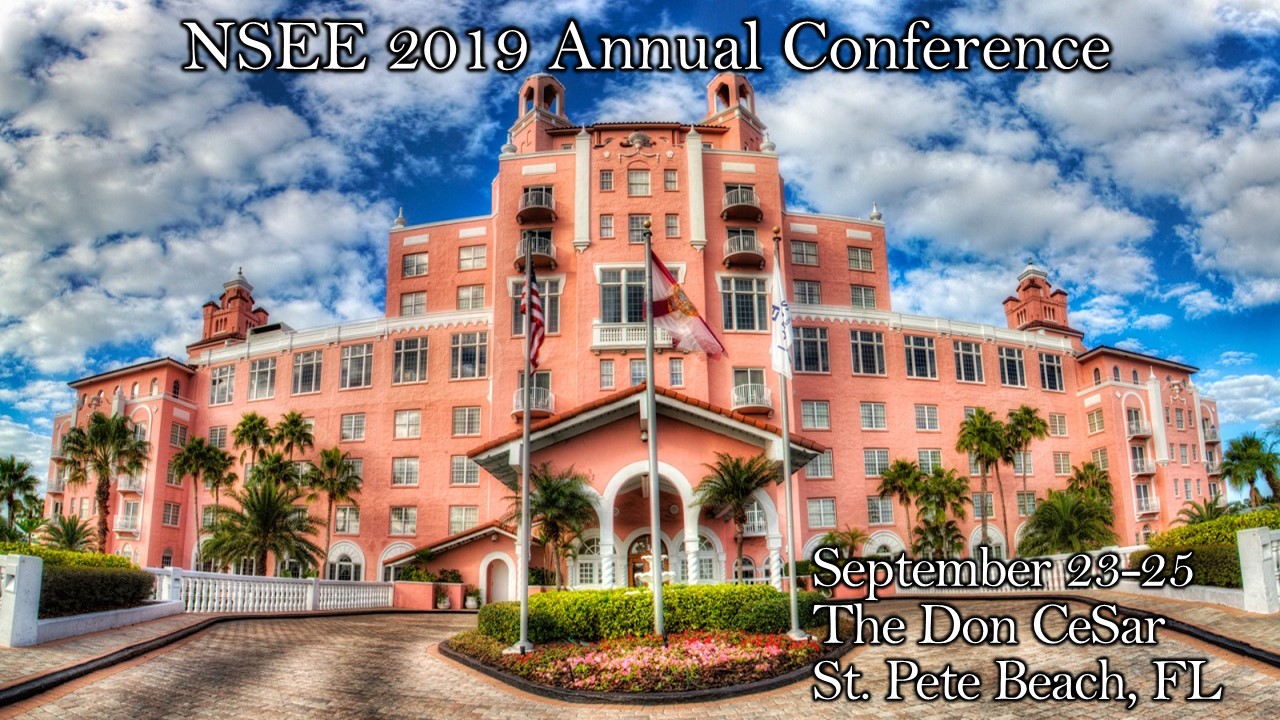
48th NSEE Annual Conference Special Advanced Workshop
Register Now! September 23,2019
Foundational Principles, Processes and Best Practice in
Designing, Delivering and Assessing Experiential Learning Programs
A Field-Based Practicum Using Sustainability, Biodiversity and Habitat Preservation
Along the Southwest Florida Littoral
Workshop Instructors:
Scott G. Blair, Ph.D., Director, Assessment & Sustainability, The EDUCATION ABROAD Network, past NSEE Board of Directors
James E. Colbert Jr., Ph.D.Associate Provost, Professor of Chemistry, Director of the EYE Program, NSEE Board of Directors

Workshop Description:
Anchored to the two NSEE foundational documents, the Eight Principles of Good Practice in Experiential Education and the Guiding Principles of Ethical Practice, this unique and extended full-day workshop provides step-by-step theoretical and practical instruction in the design, delivery and assessment of field-based experiential teaching and learning activities. The core content of the workshop—the theory behind and practical application of the 8 Principles of Good Practice and 7 Guiding Principles within instructional design—is wholly delivered experientially so that participants appreciate what practical steps and processes are required when designing, delivering and assessing experiential learning activities.
Through an out-of-class exploration of local flora and fauna at Fort De Soto Park and along the South Florida littoral near the Don CeSar Hotel, participants directly experience how two NSEE foundational documents—the Principles of Best Practice in Experiential Education and the Guiding Principles of Ethical Practice—can be used in the design and delivery of experiential teaching and learning programs or courses. The goal is to provide participants with an understanding of these foundational principles through both a theoretical examination of their content and a field-based experience of their implementation. In order to understand the various steps of good practice educators must take when designing effective experiential activities, participants are introduced to key workshop concepts and issues before, during after the actual workshop meeting day in accordance with the Kolb Learning Cycle. In the end, workshop attendees emerge with enhanced knowledge, skills and attitudes required for designing, delivering and assessing experiential learning activities from start to finish in ways that empower them to build NSEE principles and ethical practice into their own experiential programs, courses and activities.
The contextual and thematic focus of experiential group work will be selected from the following areas of analysis: responding to beach erosion and beach stabilization needs through sea oats plantings; identification and removal of invasive non-indigenous plant life; monitoring and removal of beach debris; and exploring and deconstructing local cultural, social or demographic phenomena impacting local ecology. Because these themes are authentic, they lend themselves to experiential, problem-based, teaching and learning strategies.
What’s Included?
- 8 hours of experiential onsite instruction
- Transportation to and from Fort De Soto Park
- Picnic lunch and day’s supply of drinking water
- Pre-workshop and post-workshop learning activities and study materials
- Personal engagement with local experts during the workshop
- Resource binder of supporting learning materials
- USB containing workshop resources
- All required onsite tools and supplies
- Health, safety and insurance coverage
- Certificate of achievement
Delivery Date:This full-day workshop will be delivered on Monday, September 23, 2019, 7:30 am to 3:30 pm
Cost: $399 for NSEE members; $449 for non-members.
Venue: Fort De Soto Park and beaches surrounding the Don CeSar Hotel on St. Pete Beach, Florida.
Pre-requisites: Non. However, completion of the EEA’s foundational workshops is advised. This workshop runs concurrently with EEA half-day workshops during the NSEE annual conference at the Don CeSar Hotel. Participants must be able to engage in a full day of light work within southwest Florida outdoor conditions characterized by late summer heat, sun, humidity, weeds and bugs.
Workshop Instructors:
 Scott G. Blair, PhD Scott G. Blair, PhD
International Higher Education Consultant
Assessment and Sustainability
Paris, France
[email protected]
Based in Paris, Scott Blair has worked in education abroad for over 30 years—as university professor, onsite Academic Director, education consultant and Director of Assessment for US study abroad providers. Past Research & Scholarship Network Leader for the Teaching, Learning & Scholarship Knowledge Community of NAFSA, and member of Board of Directors at NSEE (National Society for Experiential Education), he advocates for assessing student learning outcomes in terms of climate sustainability, biodiversity and human equity. He served on the faculties of the University of New Haven, the Institut National des Sciences Politiques, the Institut National des Langues et Civilisations Orientales, and the American University of Paris. He publishes research in program design and assessment in Frontiers, Routledge and NAFSA publications, and is a regular speaker at educational conferences on learning outcomes and sustainable program design in education abroad. Blair holds a doctorate in history from the Sorbonne, an MA in European history from Georgetown University, and a BA in English from Miami of Ohio.
Areas of Expertise: Administrative: Education abroad program design, outcomes assessment, external assessment instruments, quality improvement processes, intercultural competence assessment, sustainability literacy in education abroad, internationalization, experiential education, global learning, ecopedagogy.
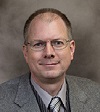
James E. Colbert, PhD
Associate Provost, Director EYE Program
Lander University
[email protected]
Dr. James E. Colbert, Jr. holds a PhD in Chemistry with a focus on biochemistry and enzymology from Georgia Institute of Technology and a BS in Chemistry from Wofford College. Dr. Colbert has 28 years of higher education teaching and administrative experience. He has served as Science Department Chair at two previous institutions, and now as Experience Your Education (EYE) Program Director, and Associate Provost at Lander University. Throughout his career he developed skills in assessment and evaluation of student learning outcomes and institutional effectiveness. As Director of the EYE Program at Lander University, Dr. Colbert manages an experiential education program employing best practices in experiential education to design, deliver, and evaluate a variety of experiential learning activities across the university curriculum and designed to fulfill requirements for a Quality Enhancement Plan (QEP) for the 2007 decennial reaffirmation of SACSCOC accreditation. In this role he has presented workshops on the EYE Program at Lander University and at regional and national conferences, including NSEE. Lander University’s EYE Program was selected for the Experiential Education Program of the Year Award by the National Society for Experiential Education (NSEE) in 2010. Dr. Colbert is a Past President of the Board of Directors and teaches the Assessment 101 workshop in the Experiential Education Academy (EEA) of the National Society for Experiential Education (NSEE).
Areas of Expertise: Throughout his career, Dr. Colbert has mentored students in a variety of field-based experiential learning activities focused on coastal ecology and environmental science examining issues of biodiversity and environmental quality in a coastal setting. At Lander University, he teaches a biochemistry course for science majors and freshman chemistry courses for pre-nursing students. His current research interests include biochemistry, enzymology, gold bioaccumulation, natural product analysis, environmental analysis, and bioremediation.
From the 2017 NSEE Annual Conference Photo Archives
|
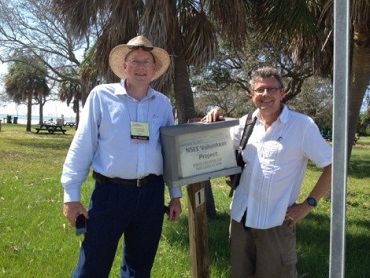
Jim Colbert and Scott Blair:
NSEE Workshop Designers and Instructors
|
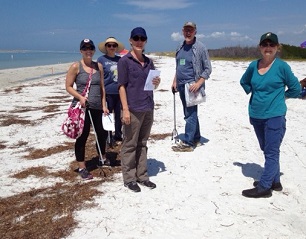
Beach Debris Monitoring
Fort De Soto Park, St. Pete Beach, FL
|
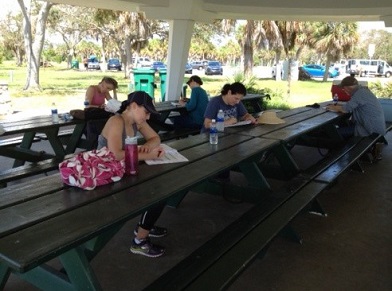
NSEE's Principles of Good Practice:
Critical Reflection and Self-Assessment
|
|

